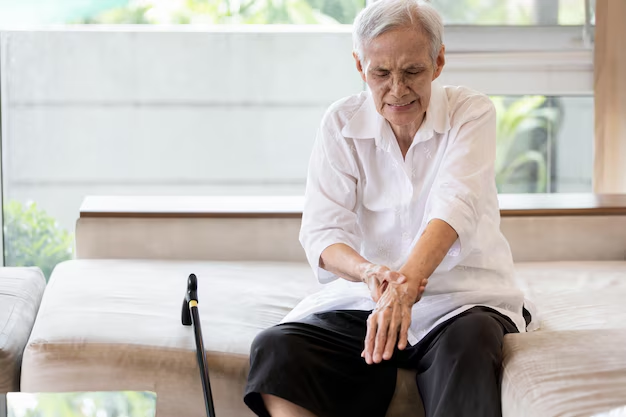Your Guide to How To Improve Bone Health In Your 60s
What You Get:
Free Guide
Free, helpful information about Health And Wellness and related How To Improve Bone Health In Your 60s topics.
Helpful Information
Get clear and easy-to-understand details about How To Improve Bone Health In Your 60s topics and resources.
Personalized Offers
Answer a few optional questions to receive offers or information related to Health And Wellness. The survey is optional and not required to access your free guide.
Building Strong Bones After 60: A Guide to Improved Bone Health
Reaching your 60s is a remarkable milestone, rich with experiences and insights gathered over a lifetime. Yet, as the body ages, managing its health and vitality becomes increasingly important, particularly when it comes to bones. With one in two women and up to one in four men over 50 at risk of an osteoporotic fracture, focusing on bone health is not just vital—it's transformative. Whether it's lifting grandkids or dancing at family gatherings, strong bones can help you continue doing what you love well into your golden years. Let's delve into practical ways to improve and maintain bone health in your 60s.
Why Bone Health Declines with Age
Understanding Bone Density As we age, our bones naturally lose density due to a gradual imbalance between bone resorption and formation. This process, known as osteoporosis, often goes unnoticed until a fracture occurs. The continued thinning of bones can silently increase the risk of injuries and diminish quality of life.
Hormonal Changes Hormones play a crucial role in bone metabolism. For women, menopause triggers a significant drop in estrogen levels, which can accelerate bone density loss. Men experience a more gradual reduction in testosterone, affecting bone strength over time.
Nutritional Shortcomings A lifetime of dietary habits can catch up in your 60s, particularly if essential nutrients like calcium and Vitamin D have been lacking. These nutrients are foundational to bone integrity and are often insufficient in typical diets.
Key Nutrients for Bone Health
Calcium: The Cornerstone of Strong Bones Calcium is vital for maintaining bone mass. Adults over 50 should aim to get an appropriate amount of calcium each day. Dairy products, leafy greens, and fortified foods are excellent sources.
The Role of Vitamin D Vitamin D aids calcium absorption and bone mineralization. Sunlight exposure and dietary sources like fatty fish and fortified products help maintain adequate levels. Especially critical for seniors, vitamin D can also support muscle function, reducing fall risk.
Protein's Impact on Bones A balanced diet with adequate protein supports bone and muscle health. Lean meats, beans, and legumes are beneficial choices. While excessive protein can be detrimental, moderate intake boosts bone density preservation.
Exercise: More than Just Bone Strength
Weight-Bearing and Resistance Exercises Engaging in regular physical activity is one of the most effective ways to strengthen bones and maintain mobility. Activities like walking, dancing, and low-impact aerobics provide weight-bearing benefits, while resistance exercises such as weightlifting foster muscle growth and bone durability.
Benefits of Yoga and Tai Chi
These activities improve balance, flexibility, and coordination, reducing the likelihood of falls. Yoga and Tai Chi also promote mental well-being, contributing to overall health maintenance.
Simple Exercises to Try:
- Walking: Aim for at least 30 minutes a day.
- Chair Squats: Strengthen lower body muscles.
- Wall Push-Ups: Enhance upper body and core strength.
Lifestyle Habits to Foster
Quit Smoking Smoking has a negative impact on bone health due to its interference with calcium absorption and the disruption of hormone activity necessary for skeletal maintenance.
Limit Alcohol Consumption Excessive alcohol can lead to bone loss and increase the risk of fractures. Moderate alcohol intake, on the other hand, is less likely to harm your bones.
Fall Prevention Adapting your living space to prevent falls is a proactive step. Use non-slip mats, ensure adequate lighting, and consider grab bars in the bathroom. Regular eye check-ups and suitable footwear also contribute significantly to fall prevention.
Monitoring Bone Health
Regular Bone Density Tests Adults over 60 should consult healthcare providers about regular bone density scans, commonly known as DEXA scans. These tests offer insight into bone mass and fracture risk, guiding customized care plans.
Biofeedback Devices Wearable technology now includes devices capable of monitoring activity levels, posture, and fall risks. These innovations support elderly individuals in maintaining independence while managing bone health effectively.
Emotional and Mental Well-being Connection
Stress Management Chronic stress can increase cortisol levels, negatively influencing bone density. Practices like meditation, leisure reading, or nature walks can promote a calming effect, conducive to holistic health.
Social Engagement Staying socially active can provide emotional support, reduce stress, and encourage physical activity. Join community centers, book clubs, or exercise groups to nurture connections.
Summarizing Key Tips for Bone Health Enhancement
🔎 Summary Section
Here's a quick reminder of key steps to boost bone health after 60:
- 🥛 Boost Calcium Intake: Incorporate dairy and leafy greens.
- 🌞 Sunshine for Vitamin D: Prioritize sunlight exposure and dietary sources.
- 🏋️ Exercise Regularly: Include weight-bearing activities and resistance training.
- 🚭 Adopt a Healthy Lifestyle: Avoid smoking and moderate alcohol consumption.
- 🍎 Balanced Diet: Ensure adequate protein and nutrient intake.
- 🏠 Prepare Your Home: Implement fall prevention measures.
- 👨⚕️ Consult Healthcare Providers: Get regular bone density scans.
By embracing these strategies, maintaining an active, healthy lifestyle becomes achievable, even with advancing age.
Making Bone Health a Priority
Incorporating these measures into your daily routine empowers you to manage bone health proactively. While the risks increase as you age, the strategies highlighted above can help you maintain or even improve bone density. Keep moving, stay informed, and ensure your nutritional needs are met—your bones will thank you.
Remember, improving bone health in your 60s involves consistent effort but leads to rewarding outcomes. It’s about nurturing a healthy lifestyle with attention, care, and dedication. Your bones are the foundation of your vitality—keep them strong and resilient!

Discover More
